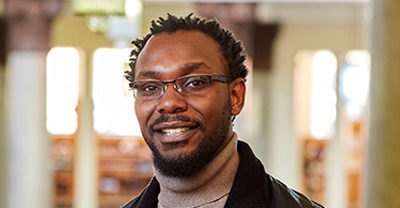Researcher of the Month - Ganzi M. Isharaza

Please introduce yourself and tell us a little about your ‘research journey’. How did you get to where you are right now?
My name is Muganzi Muhanguzi Isharaza, but usually go by Ganzi. In 2013, I successfully applied for a MA International Communications under the Commonwealth Shared Scholarship scheme at the University of Leeds. Prior to that, I had worked for several international development agencies across Africa and had been particularly struck by how much of Africa’s global image was down to messages by charity organisations. Upon completion of my MA, I briefly returned home in Uganda where I worked as both a lecturer and Communications and Marketing Manager for Uganda Christian University. While there, two things happened. First, the questions I had about international development persisted. Second, I fell in love with research and teaching and decided I wanted to be able to do both at the highest level. I successfully applied for PhD studies at the School of Media and Communication and was awarded the Leeds University Anniversary Scholarship.
Who, or what, sparked your interest to work on your particular research area?
As a development communications specialist, I have always wondered how much of Africa’s media image (as an impoverished, backward place that is doomed to fail unless it is saved from itself by the West) was a result of the kind of work I did. Africa is unique in the sense that it is the only continent in the world in which international development agencies hold such sway on the various countries’ agenda that almost nothing can happen without them. Why is that? Why is the cradle of humanity and the richest continent in terms of natural resources also perpetually at the mercy of outside forces? And what agency - if any - do Africans at an individual level have in determining this media image? Those are the questions that set me on my research journey and continue to spur me on.
What are you currently working on, and why do you think it’s important?
I am finalising my thesis, which investigates the extent and nature of influence African communications professionals working with aid agencies have on the overall messaging and imaging of the continent in the West. I am particularly focused on five of the largest INGOs operating in East Africa (Action Aid, Christian Aid, Plan International, Save the Children and World Vision). I think that although discussions about Africa’s media image have been around for a while, a key part of understanding what can be done about the continent’s media image, is figuring out what amount of agency Africans working at the grassroots of these organisations have both in terms of agenda setting and messaging (once the agenda is set).
How does your research contribute to current debates in African (and African diaspora) studies as an interdisciplinary field?
Africans’ agency in contesting and/or complicity in perpetuating the continent’s negative media image is a currently at the heart of many ongoing debates. From discussions about Afro-feminism to global moments such as #AfricaIsNotACountry or #BlackLivesMatter, there is (renewed) interest in understanding and highlighting what Africans have to say. The development sector too has experienced several scandals that have brought into focus questions about their efficacy, funding streams and the underlying assumptions behind their marketing and messaging campaigns. Personally, I have seen first-hand the life-saving work many of these agencies do. But I have also interacted with primary school children across Leeds whose only education about Africa comes from 30-second appeals that project the continent in the worst possible light. And so what my research does is to on the one hand highlight the significant amount of power Africans working with aid agencies have to determine what is seen of the continent and on the other, demonstrate beyond anecdotal evidence, the connection between say a humanitarian appeal advert in the Guardian newspaper and an ignorant, racist assertion by a would be UK Prime Minister that colonisation was a huge favour to Africans.
